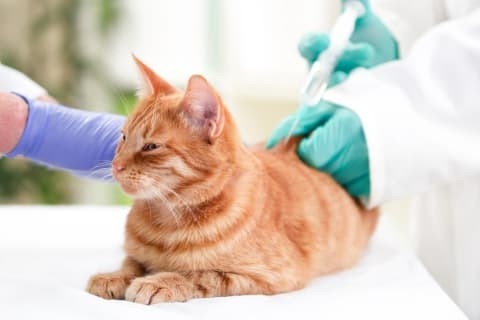For pet owners, one of the most important parts of keeping a cat safe and healthy is staying on top of their vaccinations. One essential vaccine for all cats is the rabies shot. Rabies is a very dangerous disease, and it’s nearly always fatal once symptoms appear. Thankfully, vaccinations can help prevent it.
In this article, we’ll look at when cats need their rabies vaccines, the importance of boosters, and new vaccine developments that cat owners might want to know about, like the potential cat allergy vaccine.

Why is the Rabies Vaccine Important for Cats?
Rabies is a viral disease that can affect any mammal, including cats, dogs, and even humans. It spreads through bites or scratches from an infected animal. For instance, if a cat were to come into contact with a wild animal carrying rabies, the virus could enter the cat’s body and cause serious symptoms, such as extreme aggression, drooling, and changes in behavior.
Infected cats can spread the virus to other animals and humans. For this reason, many places have laws requiring that pets, including cats, get vaccinated against rabies. The vaccine not only protects your cat but also makes sure they aren’t a risk to others.
When Should Kittens Get Their Rabies Vaccine?
Most kittens should receive their first rabies vaccine when they are around 12 to 16 weeks old. Veterinarians often schedule this as part of a kitten’s general vaccination plan. By the time kittens reach three or four months, their immune systems are strong enough to start building protection against rabies.
Giving the rabies shot at this age helps ensure that young cats stay safe as they grow and begin to explore. Even indoor cats should get vaccinated, as rabies can still be a risk if they accidentally get outside or if a wild animal enters the home.
When Do Cats Get Rabies Booster Shots?
After the first rabies vaccine, cats will need regular booster shots to keep their immunity strong. The typical booster schedule looks like this:
One year after the first vaccine: Most cats need a booster shot about a year after their first rabies vaccine.
Every 1-3 years after: Depending on where you live and the type of vaccine used, your vet might recommend boosters every one to three years. Some rabies vaccines last longer, but it’s essential to follow your vet’s advice.
These boosters are essential because immunity can decrease over time. By keeping up with boosters, you’re ensuring that your cat stays protected for life.
What Happens During a Rabies Vaccine Appointment?
When you take your cat in for a rabies vaccine, the vet will start by checking your cat’s overall health. If your cat is in good condition, they’ll proceed with the vaccine shot, which is usually given in the leg.
Most cats handle this shot well, though some might be a bit sore or tired afterward. These mild symptoms are normal and usually go away in a day or two. Serious reactions to the rabies vaccine are rare, but if you ever notice anything unusual, call your vet for guidance.
Do Indoor Cats Need the Rabies Vaccine?
Some cat owners wonder if indoor cats, who never go outside, still need the rabies vaccine. The answer is usually yes. Even though indoor cats have a lower risk of exposure, accidents can happen. A door might be left open, or a bat could get inside. In these situations, an unvaccinated indoor cat would be at risk.
Having a rabies vaccine also provides peace of mind. You’ll know your cat is safe and that you’re complying with any local laws that may require rabies vaccination for all pets, even if they stay indoors.
Potential Side Effects of the Rabies Vaccine in Cats
Most cats don’t experience any issues after getting a rabies vaccine, but it’s good to know what to expect, just in case. The most common side effects are:
- Mild soreness at the injection site
- Tiredness or slightly reduced appetite
- A small lump at the injection site that should go away in a couple of weeks
In very rare cases, cats might experience an allergic reaction. This could show up as swelling, difficulty breathing, or other signs of distress. If you ever see these symptoms after a vaccine, contact your vet right away.
Other Upcoming Vaccines: Cat Allergy Vaccine and HypoCat
Besides the rabies vaccine, there are some new vaccines in development that cat owners might be interested in.
When Will the Cat Allergy Vaccine Be Available?
Millions of people are allergic to cats, which can make it hard for them to be around these pets. Researchers are working on a new vaccine called the “HypoCat” vaccine. This vaccine wouldn’t be given to people but to cats. It’s designed to reduce the amount of a protein in cats’ saliva and skin that causes allergic reactions in humans.
When Will the HypoCat Vaccine Be Available?
The HypoCat vaccine is still being tested, but it’s showing promise. If it becomes available, it could help people with cat allergies live more comfortably with their pets. While we don’t have a release date yet, many people are hopeful it will be on the market soon.
Frequently Asked Questions about Rabies Vaccines for Cats
Can Rabies Vaccines Harm My Cat?
Most cats tolerate rabies vaccines very well. Serious side effects are extremely rare. If you’re concerned, talk to your vet about the risks and benefits of vaccination. The protection it offers far outweighs the small chance of an adverse reaction.
Is the Rabies Vaccine Required by Law?
In many areas, yes. Most states and countries have laws requiring pets, including cats, to be vaccinated against rabies. Even if it’s not a legal requirement where you live, it’s a good idea to get your cat vaccinated for their health and safety.
What Should I Do if I Adopt a Cat with No Vaccination History?
If you’re unsure about a cat’s vaccination history, talk to your vet. They might recommend starting a new vaccination schedule to make sure your cat is fully protected. Most shelters and rescues ensure cats are vaccinated, but it’s good to double-check.
Conclusion
Vaccinating your cat against rabies is one of the best ways to protect them—and yourself—from a dangerous disease. Kittens usually get their first rabies shot between 12 and 16 weeks, with booster shots scheduled every 1-3 years afterward. This vaccine is important even for indoor cats, as it protects them from unexpected encounters with wild animals or possible exposure.
As a cat owner, it’s also helpful to stay informed about new vaccines, like the HypoCat vaccine, which may help reduce allergies in the future. By keeping your cat’s vaccines up-to-date, you’re ensuring a safer, healthier life for them and a worry-free experience for yourself.
For more on cat health and care, visit CatTopTips, where you can find tips and advice for all your feline needs.


